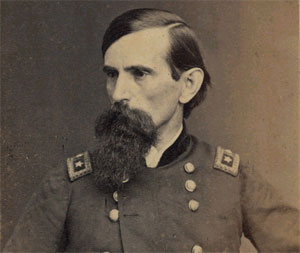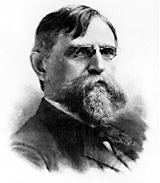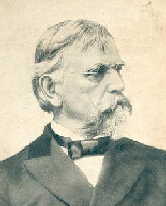
Lew Wallace
Most remembered as the author of Ben Hur, Lew Wallace reached the rank of Major General in the U.S. Army during the American Civil War, and later served a tempestuous term as Governor of the territory of New Mexico.
Lew Wallace was born in Brookville, Indiana, on April 10, 1827. He was raised without the benefit of a mother or a formal education, although his father, David Wallace, was a West Point graduate who became governor of Indiana in the late 1830s.
He left school at the age of sixteen and went to work as a copyist in the county clerk’s office in Indianapolis, studying law in his father’s law office.
Wallace organized the first Indiana volunteer unit to serve in the Mexican War. Commissioned as a 2nd Lieutenant, he served near the border, far from the action.
Returning to civilian life, he passed the bar exam in 1849, and was elected to the Indiana State Senate in 1856.
When the American Civil War broke out, Indiana Governor Morton asked Wallace to serve as the state’s adjutant. He served well in that position, and was made a Colonel of the 11th Indiana Volunteer Infantry Regiment.
 Assigned to Cumberland, Maryland, he led his troops on an 86-mile expedition, routing the Confederates at Romney, West Virginia.
Assigned to Cumberland, Maryland, he led his troops on an 86-mile expedition, routing the Confederates at Romney, West Virginia.
In September of 1861, he was promoted to Brig. General of volunteers. In early 1862, he was assigned to command a brigade at Fort Henry, Tennessee; and a division at Fort Donelson.
In March of that year, he was promoted to Major General of volunteers, with some political pressure from his brother-in-law, U.S. Senator Henry Lane.
On April 6, 1862, Confederate forces attacked Grant’s forces at Shiloh, Tennessee. Encamped six miles to the north, Wallace was ordered to move his troops to the line of battle. En route, Grant’s forces were pushed back, making Wallace’s planned route perilous. Wallace found an alternate route and arrived after the first day of fighting.
Although his troops fought well, recapturing Sherman’s camps that had been taken the previous day, he became the scapegoat for what was an embarassing show by the Union forces on the first day of fighting, when Grant’s troops had been taken by surprise. Accused at various times of having gotten lost, or of wanting to avoid the fighting, Wallace was sent home to await further orders.
He again offered his services to Indiana Governor Morton, he was assigned to organize a defense of Cincinnati; which he not only did, but turned back the Confederate forces.
In March of 1864, although still a Major General, he was commanding a single regiment; and in July, he was commanding the outnumbered Union forces at the Monocacy River in Maryland as Confederate General Jubal Early was advancing on Washington D.C. Against the odds, Wallace was able to delay Early’s forces for 8 hours, long enough for Washington to organize an adequate defense.
After the war, he held a position on the council that tried those tried for conspiracy in the Lincoln assassination, as well as the one that sent the head of the Andersonville prison to the gallows.
He then joined a movement to assist Mexican President Juarez in defending against Maximilian and the French, holding a position as Major General.
 After several months, he returned to Indiana, where he practiced law and was an unsuccessful candidate for Congress. In 1878, he accepted an appointment as Governor of the territory of New Mexico, a position he held with great opposition until President Garfield appointed him as a minister to Turkey.
After several months, he returned to Indiana, where he practiced law and was an unsuccessful candidate for Congress. In 1878, he accepted an appointment as Governor of the territory of New Mexico, a position he held with great opposition until President Garfield appointed him as a minister to Turkey.
Still, Lew Wallace is best remembered as an author, his best known book being Ben Hur: A Tale of the Christ, which was published in 1880. He also wrote a biography of Benjamin Harrison, a couple of novels, Prince of India and The Boyhood of Christ. He began writing his autobiography in 1896, but had completed only about half of his life when he died on February 15, 1906.